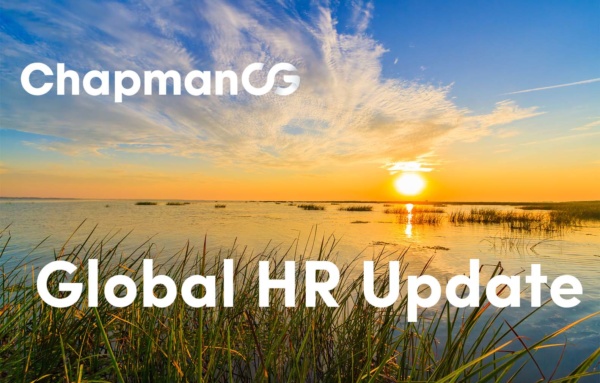The ChapmanCG Asia Pacific Series of HR Leaders Meetings Extends to Taipei, Taiwan
The Chapman Consulting Group’s Asia Series of HR Leaders Meetings has moved on to Taiwan, with two meetings in Taipei. Our first meeting was hosted by Roche’s Taiwan headquarters, and our second group met at Dialog Semiconductor’s Asia Pacific regional headquarters. Attendees at these small groups included domestic and regional HR decision-makers from companies such as ANZ Bank, ASML, ATMI, Cabot Microelectronics, Corning, Cymer, Eli Lilly, Energizer, Estee Lauder, Ford, Manulife, Marsh, PAREXEL, Schindler, Schroders, Teradyne, Wincor Nixdorf and Yahoo! to name just a few.

In order to preserve the anonymity of the information shared from these sessions, we will not be reporting on all the findings discussed. However below is a short summary of some of the most interesting points raised:
1) The Taiwan HR Head of one company shared their experiences of leading a wholesale change management effort in Taiwan. This was characterised by a ‘break then build’ approach, whereby many years of conservatism were changed within a very short period of time. Despite a high level of resistance from many corners within the organisation, the HR leader was able to successfully take the company through the period of instability, mainly through a programme of communication. This communication strategy took place on various levels, including big ‘town hall’ meetings, smaller group discussions, and very deep one-on-ones with important stakeholders. However, it was agreed by the group that communication alone is not the secret to the success of this strategy. The real secret to success was the many years of trust-building that the HR Leader and the Taiwan senior management team had invested in beforehand. Without this base level of trust, it wouldn’t matter how much communication was done. So the key to change management in Taiwan is similar to in other markets: In times of stability, make sure you are spending time building credibility and trust with senior stakeholders, because you will need to have a surplus of trust in your ‘bank balance’ for when times get tougher!

2) The Taiwan head of HR at an industrial company expanded on this issue of change management, and broke it down into four factors:
- There needs to be commitment from the senior management team and other key stakeholders;
- Communications need to be clear and consistent, and they need to target potential doubts, even before they are raised;
- There needs to be an analysis of potential operational roadblocks to change, which can account for some unintentional resistance;
- There needs to be a system in place for after the completion of the change exercise. Here favourable behaviours can be rewarded and appreciated in public, thus assisting the ongoing and long-term acceptance of change.
3) One Taiwan HR leader at a semiconductor company mentioned how they had great difficulties in attracting the best talent in Taiwan, because many domestic engineers were drawn to big Taiwanese employers such as TSMC. However the HR leader took time to create an extremely impressive and creative employee branding exercise. When the company went to university recruitment drives, they didn’t just set up a stall like all the other companies.They set up a café resembling one from this company’s country of origin, which included waitresses dressed up in traditional outfits offering a menu of coffees and cakes alongside a ‘menu’ of available job openings within the company. This was a great success in pulling strong employees into the organisation. However the key to its success was not just in the idea itself, it was in the authenticity of the message that it was delivering. In the case of this company, the working culture in Taiwan very much resembled the working culture in the company’s home country, which was seen as a true differentiating factor to Taiwanese companies such as TSMC. So people who were looking for this kind of culture could be swayed away from the company that would otherwise have been the ‘employer of choice’. However if this authenticity wasn’t there, then the exercise would have been very empty, and the new employees may have felt mis-sold on the company after they joined. The key lesson to be learnt is, whatever the unique selling point of a company, make sure it rings true in reality.
4) The HR leader for a Professional Services company in Taiwan discussed how hard it is to get Mainland Chinese nationals to come to Taiwan, even on short-term secondments. The government regulations are very tight, and in order for an application to be successful, the Chinese employee’s visa application needs to be very carefully drawn out, explaining in great detail about how their time in Taiwan will be spent on training and development exercises rather than for any Taiwan-based business execution. The group agreed that this was the only way to successfully bring Chinese employers to Taiwan.
5) The Regional HR Head of an industrial company discussed how the company had outsourced its recruitment for Asia Pacific to a third party provider. However because there were very few RPO companies with the necessary regional recruitment talent in Taiwan, the company decided to choose a supplier that could base their team out of Hong Kong instead. This solution is still under trial, but so far the regional HR team in Taiwan have been able to work successfully with the regional RPO team in Hong Kong. If successful, then this would be another example of how geographically remote teams can still work successfully across borders in Asia Pacific. We will be sure to check in with them again in 12 months!
6) And finally, another Regional HR leader explained how their company had implemented a training programme designed to help Asian talent become truly global leaders within the organisation. Out of an employee pool of 500, 20 high potentials are selected to undergo a year-long series of training programmes, covering issues as broad as communication skills, negotiation skills, how to answer (or ask) tough questions, and even how to dress. They are given real-life projects to handle, so their success can be measured in tangible business results. The programme has been particularly successful in Taiwan at this company, but had gained traction across the whole of Asia too.
We look forward to sharing more information from Asia Pacific HR Leaders as the series continues next week.
 Andrea Merrigan
Andrea Merrigan Orelia Chan
Orelia Chan Stanislav Medvedev
Stanislav Medvedev Fleur Daniell
Fleur Daniell Finian Toh
Finian Toh Tim Rayner
Tim Rayner Nicola Hasling
Nicola Hasling Stefanie Cross-Wilson
Stefanie Cross-Wilson


